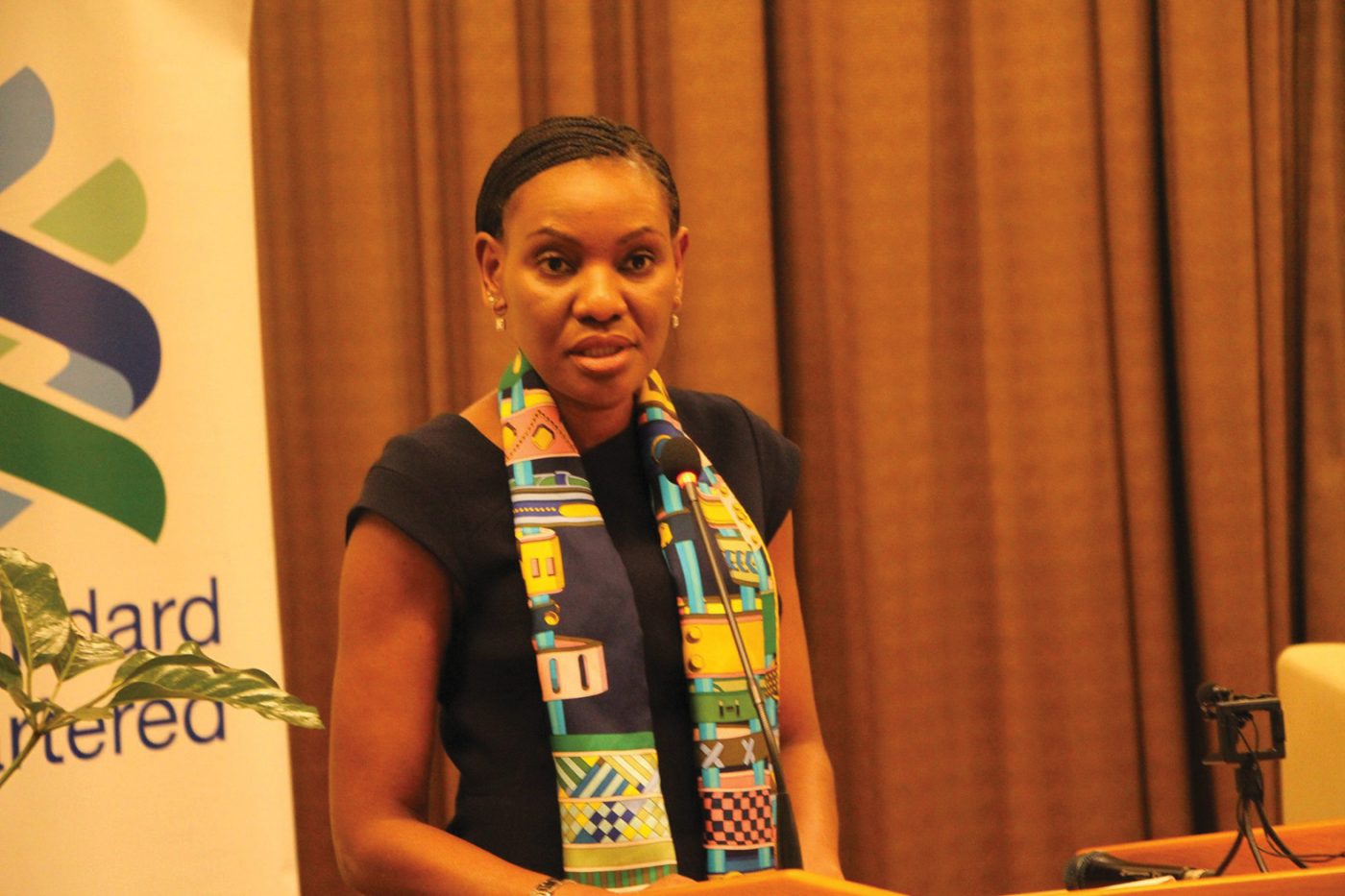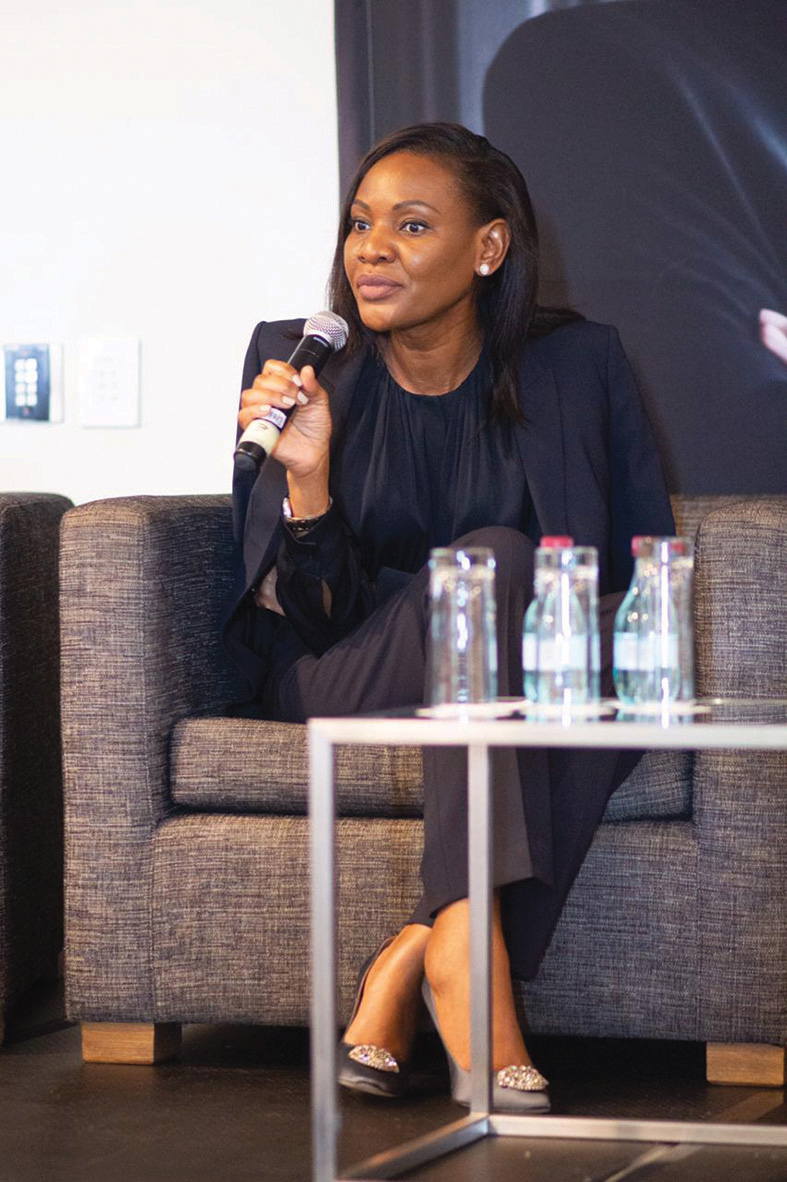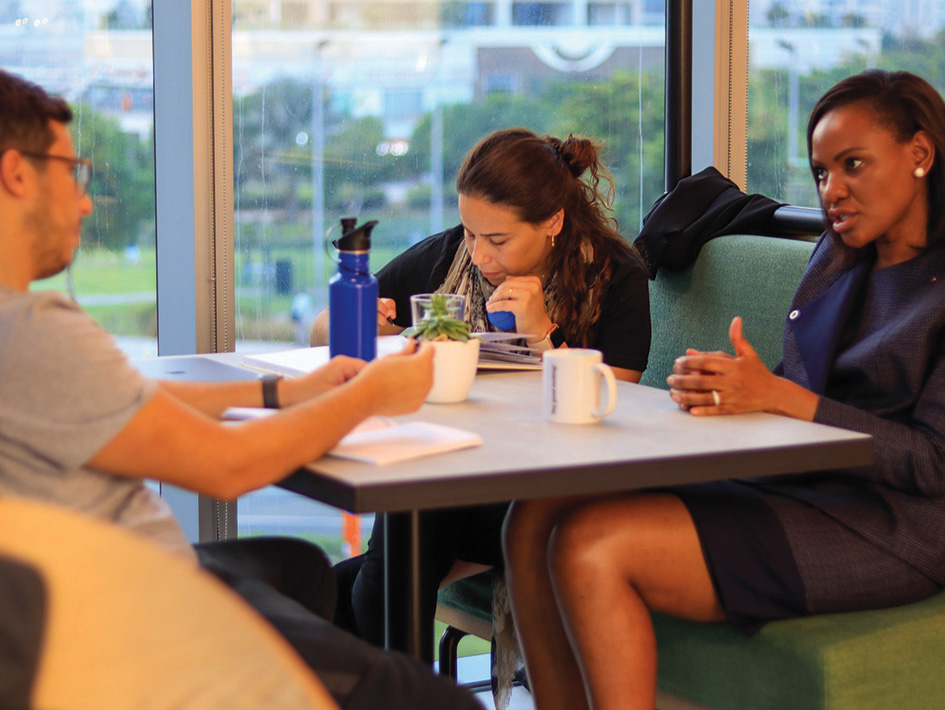#18
Olga Arara-Kimani
GLOBAL HEAD, CABM AME & INTERNAL COMMUNICATIONS AT STANDARD CHARTERED BANK (SCB)
Listed as one of Africa’s most powerful women by Forbes magazine, a change-maker and visionary, Olga’s core responsibility covers the delivery of an integrated internal communications strategy to build a stronger employer brand, aligned with the Group-wide campaigns. She is also charged with the utilization of new technologies to deliver better and more targeted content with greater audience segmentation, both internally and externally. Her remit includes the execution of the strategic agenda for Corporate Affairs and Brand and Marketing, supporting the businesses in achieving ambitious growth targets across the Africa and Middle East region.
As global head, Olga is leading and transforming the function through differentiated thought leadership events, client communication and digital engagement. She has also been tasked with embedding SCB’s refreshed strategic priorities through internal engagement programmes, sustainability agenda, external media and community engagement.
With over 24 years work experience mainly in top blue-chip banking, telecommunications and IT companies, Olga has a demonstrable track record of success in providing leadership in both strategic business development, sales, marketing and project management at a regional and global level through developing, coordinating and identifying opportunities for business. She has recently been involved in the successful rollout of the first Digital Bank for Standard Chartered Bank and is now focused on digitalization of the client engagement journey and customer analytics.
Olga is an electrical and electronics engineer by profession and holds a First-Class Master’s degree in Business Administration (MBA) in Engineering Business Management from Manchester Business School, UK. She is passionate about technology and its impact on improving the lives of the underprivileged.
A leading strategic communicator, Olga Arara-Kimani tells her story in Q and A form.
Q. In times of uncertainty, communication is arguably the most important factor of keeping employees’ anxiety at bay and safeguarding mental wellbeing. What are the methods to achieving this robust line of communication with staff?
A. The shift in our external strategy is mirrored in our internal communications efforts, as during uncertain times employees will rightfully look for guidance, re-assurance and information from senior leadership on ongoing developments.
Ensuring that employees receive valuable information while mitigating against panic and misconception across the wider corporation is absolutely essential. Leaders that practice frequent and transparent communications with employees, through words of encouragement and reassurance, are able to instil faith and provide comfort under unclear conditions.
At Standard Chartered, we’ve adopted a communications strategy that facilitates robust two-way engagement between employees and the wider team, during a time where a staggering 90 percent of our personnel were working remotely. We’ve been able to share important messages through digital channels and mobile applications, such as WhatsApp and SMS, while organising internal sessions that congregate the wider corporation through accessible platforms, such as Blue Jeans, where we hosted a regional Town hall with over 3,000 participants across Africa and the Middle East.
We’ve also prioritised the creation and dissemination of content that’s of interest, while conforming to physical barriers imposed by the Covid-19 pandemic, to ensure our employees are continuously engaged with Standard Chartered’s ongoing activities. In turn, the Bank was able to connect thousands of employees through content that drives our key messaging, further inciting confidence in our wider strategy.
Q. How have financial institutions altered their communications strategies during the Covid-19 pandemic?
A. After years of having served as a senior communications practitioner, I’ve learned that the most important attribute of any effective communicator is being able to look at yourself, your people and brands through the lens of your most important stakeholders.
When we do that, we can ask ourselves: what do I need to be doing to instil trust, to inspire, to energise, or to re-assure? Communications is essential in achieving these goals– more so during times of uncertainty.
Amid Covid-19, communicators needed to intimately understand how perceptions and expectations of their organisations and brands will change – accelerated by fear, anxiety, changing priorities, and all the uncertainty that comes with physical distancing and a future that for many is on hold or ill-defined.

Through our own experience at Standard Chartered and by watching how other organisations have navigated the pandemic, we believe the current crisis is heralding a new era of communications. Collectively, we need to have an even more relentless focus on the alignment between the needs and interests of our clients, and our own interests.
Q. What is Standard Chartered’s stance on communicating to different stakeholders amid the crisis?
A. At Standard Chartered, we’ve adapted to the ‘new normal’ by inviting clients, many of whom are deeply concerned about their finances and their ability to manage them through the pandemic, to take advantage of our wide array of digital services and have marketed these as an efficient method for consumers to conduct their day-to-day banking needs. At the same time, we’re continuing to share regular updates on the status of our operations across our various markets, including our call centre hours, branch closures and our timely transition back to the office.
During the pandemic, we have watched the digital adoption rate for mobile fixed income products increase dramatically since we introduced wealth management solutions on our digital bank platforms this year. In Africa alone, the average growth rate was 43 percent in April. The diversification of digital product offerings in investments has given clients the option to choose where to invest based on market volatility during the Covid-19 situation. However, customers still care for an experienced professional who will translate and explain the strategies proposed by the systems, while offering support in the decision-making process.

Without the luxury of face-to-face meetings, Standard Chartered has conducted 30 webinars reaching over 17,500 wealth management clients in AME during Covid-19. The webinars were conducted by the Bank’s economists and investment specialists since April 2020 to keep clients abreast of market developments and investment strategies without the need to meet face to face.
Similarly, we’ve shifted our focus to deliver our suite of external engagement activities through digital platforms. Across our various markets in the Africa and Middle East (AME) region, we’ve hosted virtual roundtables and panel discussions that engage our full range of clientele and facilitate interactions between our industry experts and consumer base.
Q. Pivoting to Standard Chartered’s longstanding presence on the African continent and its efforts to bolster a key facet of the African economy, how has the pandemic impacted female entrepreneurship?
Africa is the only region globally where more women choose to become entrepreneurs than men. However, despite this startling statistic, nowhere near enough is being done to support these females who are determined to establish successful companies. The Covid-19 pandemic has only exacerbated the issue.
In sub-Saharan Africa, around 56 percent of female entrepreneurs cite either unprofitability or lack of finance as a reason for closing their businesses. Women are often found to be underrepresented in the technology sector, and women-founded start-ups have been noted to receive limited venture capital compared to their male counterparts, with women receiving only 2.2 percent of all venture capital funding globally. This is astounding when research has shown that if female-led businesses are supported, be it through mentoring or financial support, they outperform their male counterparts, achieving higher revenues and offering a 35 percent return on investment.
The African Development Bank estimates a $42 billion funding gap for women entrepreneurs across Africa. This gap exists at various levels of entrepreneurial funding – including bank loans, angel investment, venture capital and private equity—despite there being more female entrepreneurs in sub-Saharan Africa than men.

Yet, the issue that we have witnessed with female entrepreneurs is two-fold: not enough financial support is available, and women often lack access to networks and mentorship. Time and time again, studies have shown that having access to a strong network is a critical element in the long-term success of female-led businesses.
Q. What are banks such as Standard Chartered doing to address this impact and progress female entrepreneurship?
In order to support female entrepreneurs, we must look at tackling both elements to incite real change, from empowering females to believe in their ideas through a positive network, to providing them with the financial capabilities to grow a sustainable business.
At Standard Chartered, we decided to tackle these inequalities head on with our Women in Tech Programme (WiT). Running across five markets in Africa and the Middle East, WiT provides women-led start-ups with a platform to grow their business and support their aspirations. Since its initial launch in Kenya in 2017, we have seen continuous growth of female entrepreneurs coming through the accelerator programme, with the Bank providing over $500,000 to various programme cohorts in markets including Nigeria, Pakistan, Bahrain and the UAE. To date, from cohort one, 4 out of 5 of the companies have received investor funding ranging from $50,000 – 150,000, and their businesses have grown revenue and sales in double digits. In addition to growing their businesses, some of the companies have been able to form strategic partnerships with multinationals like MasterCard and Uber.
We recognise that there is a growing tech ecosystem across the continent and that many start-ups are embracing the benefits of technology. WiT is a unique programme in that it not only addresses two of the key problems facing female entrepreneurs, but also tackles the digital-gap many female-led entrepreneurs experience. It’s not surprising that most female entrepreneurs we encounter through the programme want or are using technology to grow their business.
Over time, Olga has been a recipient of a number of awards, the most notable being:
• Top 40 under 40 Women in Kenya 2011
• Forbes Top 20 Youngest Power Women in Africa 2012
Olga lists- Remodelling old cars and farming Mallard ducks among her hobbies.
















